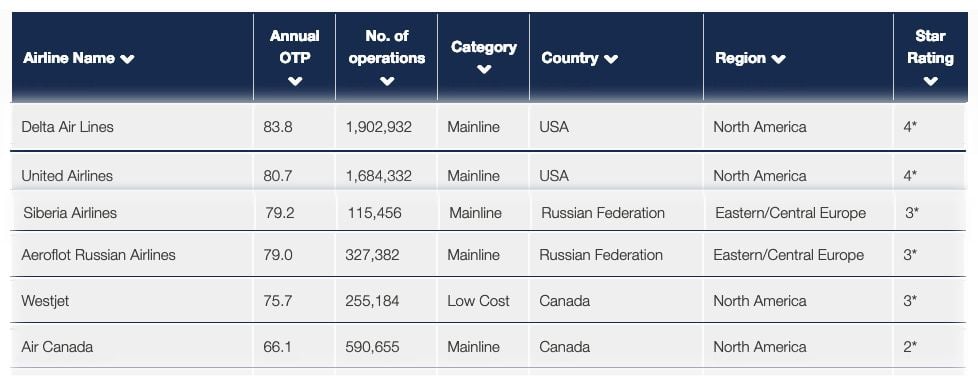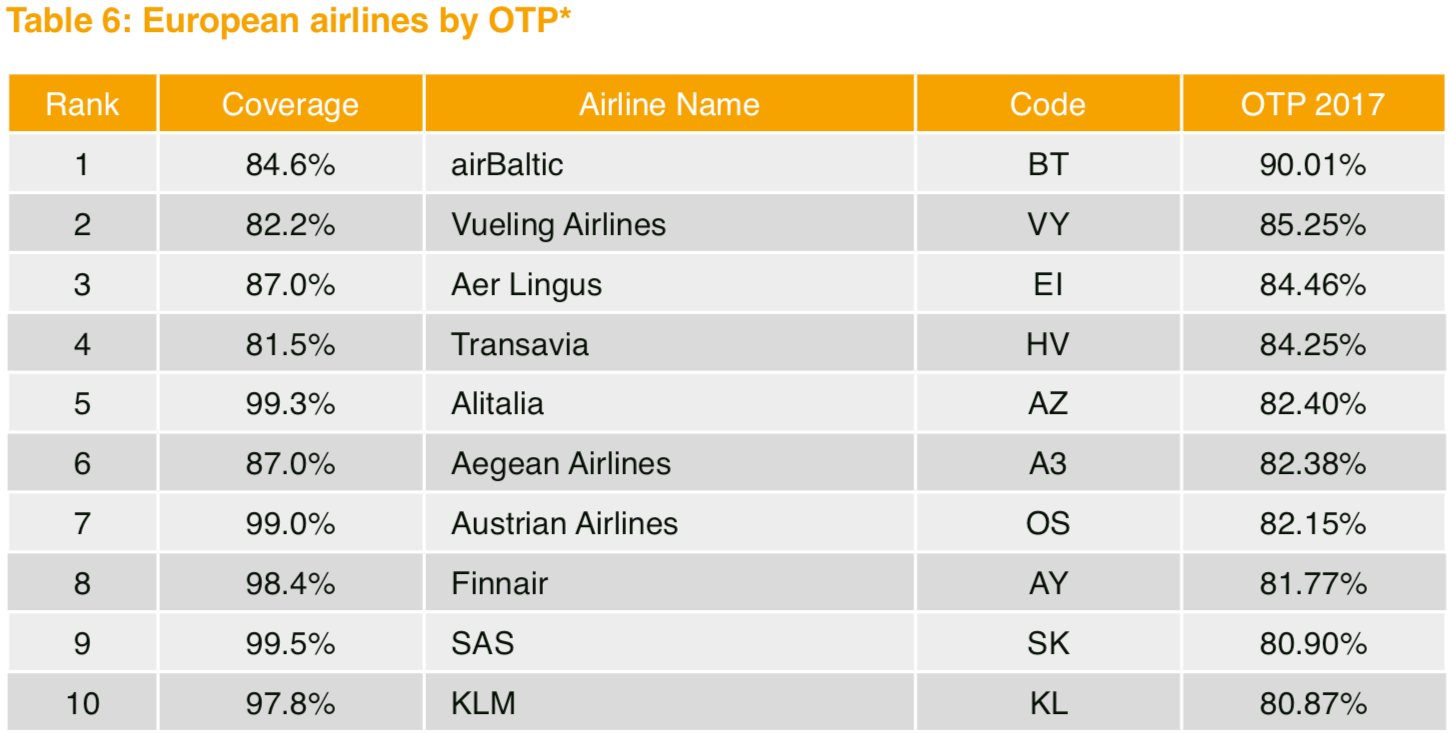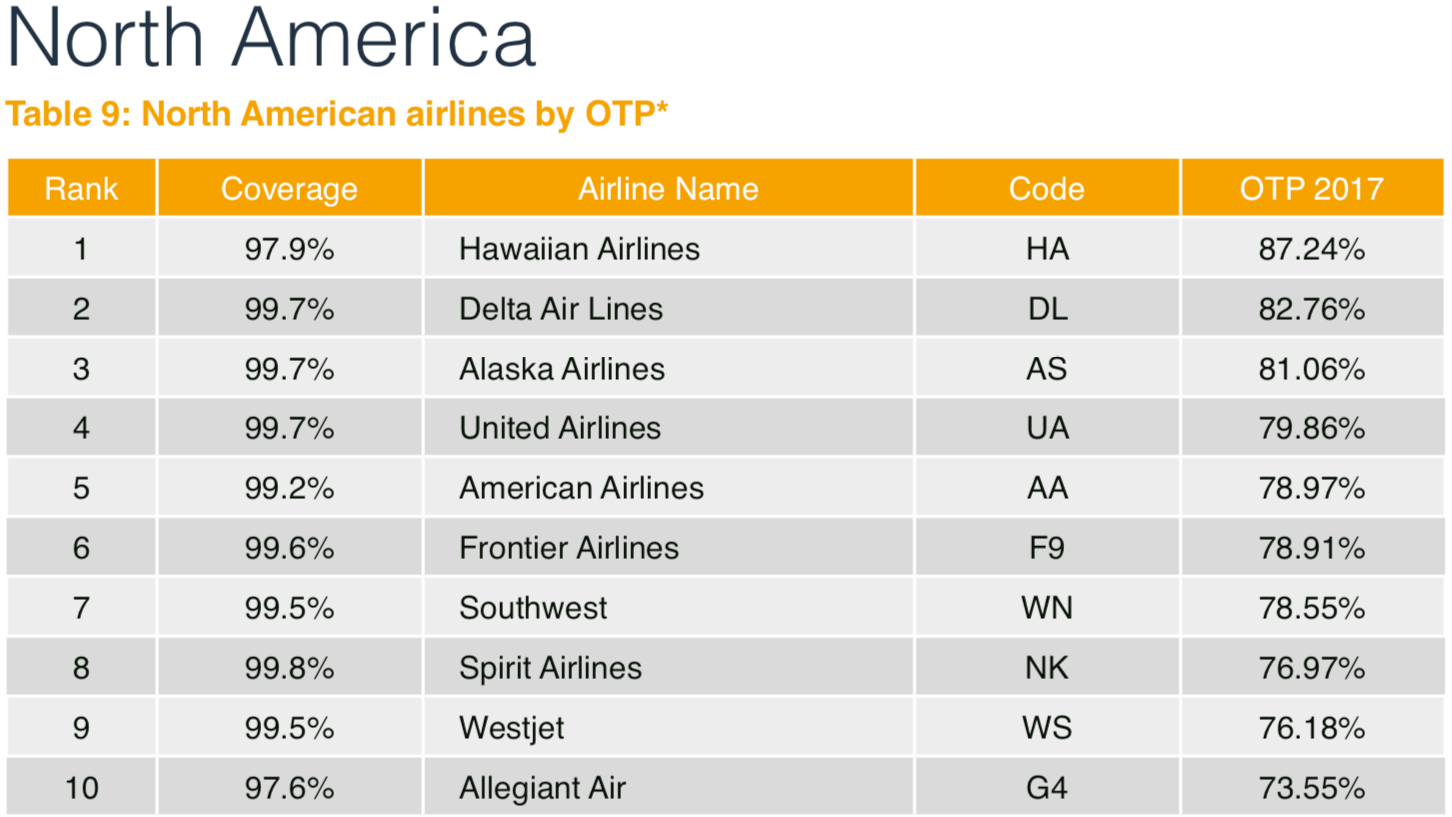Air Canada OTP Getting Worse?
#106
Join Date: Nov 2017
Posts: 3,359
From OAG.com
Delta, with major hubs in MSP and DTW (which get similar weather to YYZ and YUL) achieves substantially better OTP than AC. Ditto for UA with its main hubs in ORD, DEN and EWR, three of the most weather delay-prone airports in the world.
Aeroflot and Air SIberia achieve substantially better OTP than AC too, while coping with a similar climate. So does Westjet, flying out of most of the same airports and under the same weather conditions as AC.
Apologists can apologize all they want. The facts are clear. Weather is simply not an excuse for AC's substandard OTP.

Delta, with major hubs in MSP and DTW (which get similar weather to YYZ and YUL) achieves substantially better OTP than AC. Ditto for UA with its main hubs in ORD, DEN and EWR, three of the most weather delay-prone airports in the world.
Aeroflot and Air SIberia achieve substantially better OTP than AC too, while coping with a similar climate. So does Westjet, flying out of most of the same airports and under the same weather conditions as AC.
Apologists can apologize all they want. The facts are clear. Weather is simply not an excuse for AC's substandard OTP.

- WS has about half the movements of AC - naturally the more movements (and outstations) you have the more difficulty you'll face
- OTP is less important when you have an extensive route network (and alliance) that can route you out of trouble - no 60 hour delays for this AC passenger

- WS has fewer variety of aircraft: 737s, 767s and now 787s making repairs easier for them
- It is easier to turn around a 737 than a 777ER on time (especially when flying INTL)!
- WS takes off from far fewer regional airports than AC (i.e. YZR or YQG) - regional airports are more likely to be impacted by controllable events like WX.
-James
#107
FlyerTalk Evangelist
Join Date: Jan 2002
Location: Canada
Programs: UA*1K MM SK EBG LATAM BL
Posts: 23,314
It's not fair to compare WS' OTP to AC's for a number of reasons:
-James
- WS has about half the movements of AC - naturally the more movements (and outstations) you have the more difficulty you'll face
- OTP is less important when you have an extensive route network (and alliance) that can route you out of trouble - no 60 hour delays for this AC passenger

- WS has fewer variety of aircraft: 737s, 767s and now 787s making repairs easier for them
- It is easier to turn around a 737 than a 777ER on time (especially when flying INTL)!
- WS takes off from far fewer regional airports than AC (i.e. YZR or YQG) - regional airports are more likely to be impacted by controllable events like WX.
-James
2. UA has the same exact alliance as AC, yet 15% better OTP, so your I can be late because I have an alliance theory is see #1 .
3. DL/UA/AA have a more diverse fleet, and yet a much better OTP
4. See #3
5. The chart was for mainline, I had no idea mainline AC flies to Sarnia

#108
Join Date: Nov 2017
Posts: 3,359
2. UA has the same exact alliance as AC, yet 15% better OTP, so your I can be late because I have an alliance theory is see #1 .
Fair point. Although AC also has ancient aircraft (17 years versus the 10-15 year average range of UA/AA/DL/WS - nothing to be proud about but still!)
4. See #3
-James
#109
Join Date: Feb 2009
Location: YYC
Programs: BA bronze, Aeroplan peon
Posts: 4,747
How about British Airways, where the vast majority of it's flight go through LHR, one of the most congested airports in the world that runs at 99.5% capacity in good weather, and it's OTP is 11% better than AC. No matter how you try and spin it, AC's OTP is abysmal.
Last edited by Jagboi; Feb 19, 2019 at 5:27 pm Reason: typo
#110
Join Date: Nov 2017
Posts: 3,359
Another thing that would be interesting to compare would be the aircraft utilization of Canadian versus RoW airlines. Perhaps AC runs their airplanes at 90% capacity resulting in less leeway when the proverbial IRROP hits the fans.
That being said, I'm not a frequent AC traveller. Most of the time I'm flying UA. However, when I did fly domestically a lot in 2016 and 2017 I did find that AC did better than TS or WS at least on domestic OTP.
-James
#111
Join Date: Dec 2014
Location: YVR
Programs: Bottom feeder Star Gold
Posts: 2,652
Originally Posted by j2simpso
They also have more backup aircraft
Originally Posted by j2simpso
(there may be a couple Airbus aircraft UA bought in error but they are few and fare between and have little impact on OTP).
Originally Posted by j2simpso
EU airlines are not relevant for comparison since they have an implicit force that is causing their OTPs to be great, namely the EC261 compensation they must provide when they drop the ball.
Originally Posted by j2simpso
Perhaps AC runs their airplanes at 90% capacity resulting in less leeway when the proverbial IRROP hits the fans.
Originally Posted by j2simpso
That being said, I'm not a frequent AC traveller.
#113
Join Date: Nov 2017
Posts: 3,359


In addition, to the point about BA - they are a one hub airline. You can't compare a one hub airline like, say, BA, to a multi-hub airline like AC with parts, expertise and facilities scattered throughout a large geography. If anything goes mechanical at LHR chances are it will get sorted quick. If something goes mechanical at YYC, YMMV!
Not really, my lack of flying exclusively with AC shouldn't exclude me from commenting on AC OTP, especially if I have tons of anecdotal evidence from the other Canadian airlines (i.e. the Skunk, WS and TS). If everyone on FT had to exclude them from threads they aren't experts of with the most definitive knowledge these forums would be crawling with tumbleweeds

-James
#114
Join Date: Jun 2012
Location: YYT
Programs: AC P25
Posts: 269
Seems thereís always an active OTP thread here and itís pretty much always constant excuses put forth to ďexplainĒ why itís not ACs fault. Itís pretty amusing.
If another airline has more spares available, wouldnít that mean they planned it that way and spent a little extra to have extra flexibility?
Iím also finding the argument that ORD, EWR, SFO , etc. are less delay prone than Canadian airports a little hard to digest. Does anyone have any time to put in an analysis on the effect of weather delays on AC vs the hubs of other comparable airlines?
On the fleet type argument, Iíll make my own unsubstantiated claim and say AC has it easier routing everything through YYZ centrally. These other fragmented airlines must certainly have a disadvantage.
If another airline has more spares available, wouldnít that mean they planned it that way and spent a little extra to have extra flexibility?
Iím also finding the argument that ORD, EWR, SFO , etc. are less delay prone than Canadian airports a little hard to digest. Does anyone have any time to put in an analysis on the effect of weather delays on AC vs the hubs of other comparable airlines?
On the fleet type argument, Iíll make my own unsubstantiated claim and say AC has it easier routing everything through YYZ centrally. These other fragmented airlines must certainly have a disadvantage.
#115
FlyerTalk Evangelist
Join Date: Jan 2002
Location: Canada
Programs: UA*1K MM SK EBG LATAM BL
Posts: 23,314
#116
Join Date: Nov 2017
Posts: 3,359
To reiterate Canadian airports and airlines all stink. As much as AC likes to beat their chests and proclaim they're an international airline and the only airline with a 4 Star rating from StarTraxx in North America, the reality is quite different! Much improvement to be made in this category!
If another airline has more spares available, wouldnít that mean they planned it that way and spent a little extra to have extra flexibility?
 ). It is true that some cities do have friendlier weather for flying, although given the effects of climate change those advantages will likely erode over time. That's to say nothing of the costs associated to airlines and airport authorities to change their hubs! To answer your question on how delay prone the US airports are, per OAG:
). It is true that some cities do have friendlier weather for flying, although given the effects of climate change those advantages will likely erode over time. That's to say nothing of the costs associated to airlines and airport authorities to change their hubs! To answer your question on how delay prone the US airports are, per OAG:- SLC : 86.01%
- MSP : 85.72%
- DTW : 83.30%
- PHX : 83.22%
- IAH : 82.43%
- ATL : 82.38%
- DEN : 82.24%
- DFW : 81.36%
- IAD : 81.79%
- SEA : 80.35%
- ORD : 79.85%
- LAX : 74.66%
- JFK : 73.37%
- SFO : 72.05%

But that's not the case with AC. At a minimum I would say YVR and YYZ are their central hubs. Others on the forum have argued that YUL and YYC should be considered in contention as a central hub for AC.
#117
Join Date: Nov 2017
Posts: 3,359
-James
#118
Original Poster
Join Date: Jun 2010
Location: YYG
Programs: airlines and hotels and rental cars - oh my!
Posts: 3,000
- WS has about half the movements of AC - naturally the more movements (and outstations) you have the more difficulty you'll face
- OTP is less important when you have an extensive route network (and alliance) that can route you out of trouble - no 60 hour delays for this AC passenger

- WS has fewer variety of aircraft: 737s, 767s and now 787s making repairs easier for them
- It is easier to turn around a 737 than a 777ER on time (especially when flying INTL)!
- WS takes off from far fewer regional airports than AC (i.e. YZR or YQG) - regional airports are more likely to be impacted by controllable events like WX.
If anything given the recent deflateGate debacle, I for one wouldn't mind my AC INTL flight being delayed by an hour or more if it means my lie flats won't stay flat!
-James
-James
1. And Delta has 4x the movements of AC and 18% better OTP, so your "naturally more difficulty" theory is ???
2. UA has the same exact alliance as AC, yet 15% better OTP, so your I can be late because I have an alliance theory is see #1 .
3. DL/UA/AA have a more diverse fleet, and yet a much better OTP
4. See #3
5. The chart was for mainline, I had no idea mainline AC flies to Sarnia
2. UA has the same exact alliance as AC, yet 15% better OTP, so your I can be late because I have an alliance theory is see #1 .
3. DL/UA/AA have a more diverse fleet, and yet a much better OTP
4. See #3
5. The chart was for mainline, I had no idea mainline AC flies to Sarnia

DL has major hubs in Minneapolis and Detroit. Those cities regularly get the same or worse weather than YYZ and YVR. Yet DL manages a vastly better OPT. Same for UA, with hubs in EWR and ORD, two of the worst airports in the world for delays. The "the other guys have hubs in better climates" argument just doesn't hold up James, sorry. If hubs matter, then please explain why Siberian Airlines has such a vastly better OTP than AC with its hubs located in Moscow and Novosibirsk.
AC's OTP is consistently substandard, and has been for years. There are never any shortages of excuses. Yet there are never any actual improvements in OTP. Sad.
#119
FlyerTalk Evangelist
Join Date: Jan 2002
Location: Canada
Programs: UA*1K MM SK EBG LATAM BL
Posts: 23,314
Has it been like this for years? I mean ~70% in the winter perhaps excusable, but seems like they are now in the last couple years barely pulling 65% in the summer, and winter hovers around 50%. Has it really always been this bad? How do people keep flying this airline (especially for work) - if it's only half reliable?
#120
Join Date: Dec 2014
Location: YVR
Programs: Bottom feeder Star Gold
Posts: 2,652
In addition, to the point about BA - they are a one hub airline. You can't compare a one hub airline like, say, BA, to a multi-hub airline like AC with parts, expertise and facilities scattered throughout a large geography. If anything goes mechanical at LHR chances are it will get sorted quick. If something goes mechanical at YYC, YMMV!
Not really, my lack of flying exclusively with AC shouldn't exclude me from commenting on AC OTP, especially if I have tons of anecdotal evidence from the other Canadian airlines (i.e. the Skunk, WS and TS). If everyone on FT had to exclude them from threads they aren't experts of with the most definitive knowledge these forums would be crawling with tumbleweeds 

But what is the Skunk???



















